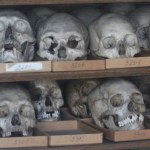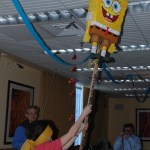Scientists
Among the different professional categories, scientists and engineers remain very highly respected by the public, at least compared to politicians, business leaders, the media, and even religious authorities. Part of this is due to the fact that success in the scientific enterprise depends on impartial analysis and independence from political ideology. And yet there are strong connections between science and policy: good policy without good science is difficult; good policy with bad science is impossible. Sure, there is plenty of bad policy made even in the face of contradictory scientific…
This year's CWTS Leiden Ranking put the Weizmann Institute at number 10 -- and number one outside of the US -- for impact.
What is impact? In dry terms, it is publications in excellent journals and citations, weighted for institute size and evaluated by subject. This prestigious ranking favors the Weizmann Institute, because it compares institutes and universities solely on the basis of published research.
So you can measure impact and give it a rank. But that number is, ultimately a proxy for something a bit more abstract: We really think of it as the part our scientists play in advancing…
Prof. Mario Livio takes the long view on science. In his newest book, Brilliant Blunders, he points out some of the mistakes made by some icons of science -- Einstein and Pauling among them. More importantly, he insists that researchers must be free to make mistakes.
Livio recently gave us a taste of his subject matter in a talk at the Weizmann Institute (in English):
http://www.youtube.com/watch?v=sYaMlTn275A
"[S]cience is not a consumption good to be expanded in good times and restricted in bad times. The doing of science as well as the supporting of science is an expression of faith in the future. It would have been possible to have told Newton and Faraday, Maxwell and Einstein, Bohr and Heisenberg that, given the poverty and squalor around them, their research were luxuries which could not be afforded. To have done so would be to destroy the economic c progress that came out of their science and which was the main factor in relieving that poverty and squalor. We seem to be on the verge of…
What happens when a former physics-student-turned-documentary-director is invited to create a video clip for the first ever physics reunion? The answer is below.
You may not learn anything new about physics by watching it, but you will note that Weizmann President Prof. Daniel Zajfman and VP Prof. Israel Bar-Joseph are featured, along with others.
Touching Something No One Found
It's not every day that you read about measuring skulls in the contemporary scientific literature. It's kind of a quaintly old-timey, quaintly racist kind of thing to do. But here we are, with a brand new paper about skull measuring in PLoS Biology. Already quite a few blog-words have been written in support of this new paper, which disproves Stephen Jay Gould's assertion in The Mismeasure of Man that George Morton's 1839 skull measurements were fudged intentionally or unintentionally by his racist bias.
I haven't read a lot of Gould, and I'm pretty convinced by the numbers in the paper…
Last month I wrote about my friend Devin Burrill's paper about synthetic memory in yeast cells. There were a lot of really interesting questions left in the comments, and I asked Devin if she would write a guest post to answer them. She agreed and here it is, answers to your questions straight from the author!
Hello Readers!
My name is Devin, and I am so incredibly grateful to Christina for allowing me to write an entry on her awesome blog. Christina and I are friends and work together in the lab of Pamela Silver at Harvard Medical School. I am writing in response to a number of excellent…
It's been an exciting week for me. On Monday I successfully defended my thesis! Now that I have established my scientific credibility to you all, here is a picture of me at my defense party wearing my "Trust me I'm a Dr" Dr. Pepper t-shirt and hitting my SpongeBob SquarePants piñata.
And on Tuesday I went to two really interesting events/talks/discussions about science and scientists. First up was Debbie Chachra's awesome seminar "Unpacking Gender: Men and Women in Science, Technology, and More," sponsored by the Harvard Graduate Women in Science and Engineering. She described her seminar…
I had a great conversation with Maggie Koerth-Baker from BoingBoing for bloggingheads.tv Science Saturday. We talked about all sorts of sciency stuff, including her upcoming book on the challenges of renewable energy, synthetic biology, the similarities between cheese and the human body, women in science/blogging, and octopus brains. I had a lot of fun chatting with Maggie and I learned a lot, and I hope you will too!
Scientists aren't known for their fashion sense, but they do have their own unique charm, as you can see in this episode of In The Lab, with Bill Cunningham.
Nick pointed me to a fabulous podcast series by CBC radio called "How To Think About Science." Each episode is a long and fascinating interview with a prominent scholar of science--scientists, philosophers, sociologists, anthropologists, and historians who explore how science is done, how scientists work, and how scientific ideas and facts are communicated. Check it out!
Stephen Schneider, a friend of Seed's and a giant of climate science, passed away yesterday. He was 65.
Stephen participated in a Seed Salon a few years ago with Laurie David. I just re-read it and found this quote: "My students are always asking, 'Aren't you frustrated to death? Nothing you do makes any immediate difference.' What I keep trying to tell them is, the truth matters, but it's on a generational time frame."
Did anyone have Stephen as a professor or advisor at Stanford?
From the obituary in the New York Times:
Dr. Schneider wrote books on the effects of climate change on areas as…
As if Pepsigate wasn't enough to get people riled up, this could be even move apocalyptic!
H. Steven Wiley takes a close look at the real Two Cultures, Scientists vs. Engineers!
In the past, I have heard there was conflict between the "two cultures" of science and the humanities. I don't see a lot of evidence for that type of conflict today, mostly because my scientific friends all are big fans of the arts and literature. However, the two cultures that I do see a great deal of conflict between are those of science and engineering.
*snip*
At one extreme, you have basic scientists, who seek to…
Steve Shapin, Professor of the History of Science at Harvard, and author of the excellent book, A Scientific Life, wrote an essay for Seed in 2008 on the state of the scientist that has new relevance.
In one sense, the enfolding of science in structures that produce wealth and project power is just a sign of its practitioners' immense success over the course of the past century.
As we enter the 21st century, new institutional configurations for doing science emerge, together with new scientific agendas and new conceptions of what it is to be a scientist. Some participants and observers of…
After hosting blogs for four years, it's about time I started my own. So, welcome!
Let me begin with a bit about me and what I believe.
I believe that science has the unique potential to improve the state of the world. I think this potential is being hindered today by a lack of science literacy around the world and by the largely closed and restricted nature of the world's scientific information. Two connected topics (ie. Science Literacy and Open Science) that I care passionately about and will delve deep into on this blog. I also believe that science can be more than a subject; it can be a…
tags: Great Microbiologists, Lego, brickfilm, animation, technology, scientists, history, microbiology, animalcule, streaming video
This is yet another Lego animation. This time, instead of recreating highlights of the World Cup 2010 games, this one shows highlights for the history of the field of microbiology. It's actually good enough to show as an intro to a microbiology course.
More Lego films can be found at Brickfilms.
tags: I'm a Scientist, Get me out of Here!, internet chatrooms, online program, technology, public outreach, scientists, employment, what do scientists do?, Science and the Importance of Cheese, streaming video
This video is a trailer for a movie proposal by protein crystallographer, Stephen Curry. If he is lucky, he will continue on to the June 2010 rounds of the online program, "I'm a scientist, get me out of here!" targeted at teens. He proposes to make this film if he is voted to win the â¤500 award.
"I'm a Scientist, Get me out of Here!" is a new online program targeted to UK…
Another day, another article about how women are biologically inferior to men when it comes to high-level math and science. The fact that this one comes from the New York Times Science section, a newspaper I typically respect very highly, is all the more tragic and frustrating. I don't have time today to write with as much depth and ferocity as I would like to, but I want to just say that I find it outrageous that the New York Times would publish something so obviously sexist and one-sided about such a complex, nuanced, and important topic under the headline "Daring to Discuss Women in…
The World Science Festival starts today in New York City with tons of exciting events from BioArt to The Science of Star Trek and all sorts of great stuff in between! If you can't make it to New York there's also a twitter page and a blog here on ScienceBlogs accompanying the event that you can follow along with, and I had the chance to write a post over there about how I got into science as a kid. So go check it out! "What if Science Were Like Sports?" Here's a little teaser:
I'm realizing that perhaps in yesterday's post I took everyone's love and understanding of postmodern feminist theory for granted so I'm going to start a little series of posts that I think will slowly introduce some of the issues that I spend a lot of time thinking about and hope that other people will too. Today I'm going to jump right into it by posting the essay I wrote for a horrible class I took about science and religion called Belief Options for a Practicing Scientist. The assignment was to write a five page essay on what the best belief option for a scientist is and why. I think that…



